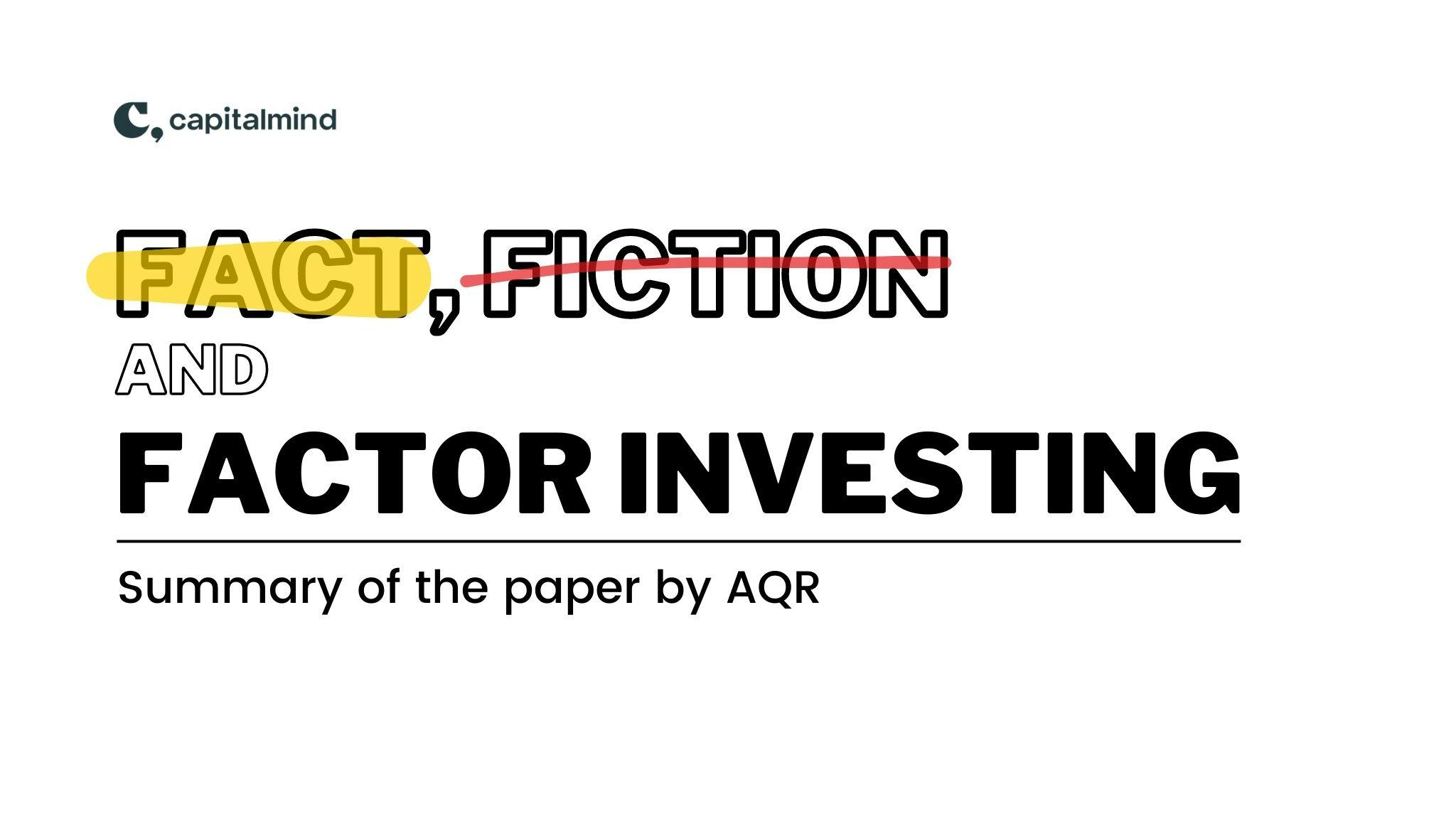(category)Charts & Analysis
Will changing regulations solve the underpricing of holding companies?Will changing regulations solve the underpricing of holding companies?
India has many holding companies that are listed, which just own other listed companies. They trade at a discount. Will new SEBI rules reduce this discount and bring more value to holdco shareholders? Read on.
Deepak Shenoy•

Elcid has only 200,000 shares outstanding. So technically, it should be valued at Rs. 580,000 per share.
But Elcid has a market cap of just 7 lakh rupees. At a price of Rs. 3.5 per share. Incredibly undervalued, you think?
Sadly, you can't bridge that valuation gap, because no one wants to sell it at the current price (obviously) and the price-bands of 5% per day ensures that the price can never get anywhere close. It will take forever to get to a value even somewhat close to its real value. In fact, no one will ever sell at this value, so the price will not go up, really, for the price bands to even reset upwards a little bit.
SEBI has taken note and decided that enough is enough. Once a year, it has said in a circular, for companies like this:
- which have 50% or more of their net worth as market values of shares of other companies, and
- which trade at a price that's less than 50% of such market values
Must have a "call auction". Here, there are no price bands, and everyone gets to bid and offer whatever price they want. That, says SEBI, might allow for shares to trade at a better price, which can then be the basis for price bands on subsequent days. This will happen first in October 2024, and then on, once a year for all such companies.
This might just work for an Elcid, if there are people willing to sell. They can then offer the share at whatever price they want, and a buyer can bid for them. The call auction will collect all bids and offers and if they find successful matches of at least five distinct investors, the auction will be a success. The discovered price will then be used for trading and price bands on subsequent days.
Will that close holding company discounts?
Elcid is a tightly held company. The promoters own 75% of the stock, the maximum permissible level. They can't buy any more shares. But the ownership of other entities is about 25%. Some of whom have directors with the same surname as Asian Paints promoters, but why would they sell? And why would anyone want to buy?
In India, companies are valued on two things:
- how much a company's eventual cash flow is to an investor (through dividends or buybacks or such)
- what will other people value this company at in the future
The traditional view is very conservative, that only the first of the above applies.
Meaning: every company can only be valued on future cash flow. But that's only in theory; people simply value companies by "what will others value it" a lot more than we think. Also, the concept of what future cash flow is debatable, and will never be written in stone. Asian Paints has been at 20x earnings, 80x and then back to 50x, all in the last decade or so - and each one of these can be justified with an entirely different (and sometimes contradictory) discounted cash flow assumption. In effect, it's a lot more about betting on what other people think the value will be, rather than just looking at earnings.
Let's look at the cash flow for investors of Elcid, first.
Valuing a holdco: Dividend multiple
All that Elcid earns is dividends. Elcid earns, effectively, Rs. 110 cr. in dividends directly, or Rs. 5,500 per share. But how much does it pay out to investors? Rs. 25 per share.
Which means it keeps the money rather than paying it out, and the money then just adds up. There's no meaningful dividend flow to investors, even when 75% of these investors are the promoters themselves. The point here is that the company has not shown any real intention of paying out dividends that it receives, even when it has no use for the money.
This cash remains in the company, and if there is no intention to pay it out or otherwise use the money, it can't be valued meaningfully by the market. There's another way to value a holdco, however.
Valuing a holdco: Intrinsic value
The second way to realize the value of a holdco is for it to actually sell what it owns, and then pay out shareholders. If you have enough money you could buy a majority of the company and then force it to sell the investments. In most holdcos in India, though, the promoters own 75% or close to it, and will not allow you to get a majority shareholding.
Will they sell it? Well, the holdco is a promoter of a larger listed company, and if the holdco sells shares, then the promoter shareholding will reduce in the larger company. Why would they bother doing that? Given that they have to then share those profits with the minority shareholders of the holdco, it would be their absolute last resort.
So:
- The holdco doesn't pay a dividend it gets from the larger listed entity that it owns shares of
- It won't sell the shares to realize the value
- You cannot force it to do so as the promoters own a majority
- Why would you then pay the full "intrinsic" value of the shares, ever?
This is why in India, holdcos are valued substantially lower than the value of their investments. Apart from Elcid, even companies like Bajaj Holdings, Chola Holdings, Bombay Burmah etc. trade at a discount of as much as 50% below the market value of their investments.
We've done a video on why this happens, if you'd like to watch.
What kind of holdco discounts are there in the market now?
Markets have valued holdcos at substantial discounts. Bajaj Holdings and Maharashtra Scooters are both promoters of Bajaj Auto, Bajaj Finserv and the like. These trade at a 60% to 70% discount to their underlying market value of the stocks they hold.
The discounts have largely persisted through market cycles, though the discount reduces when markets are bullish.
Holdco ownership and the new Companies Act
The idea of buying into a holdco is strengthened with the new Companies Act, 2013. It has rules that:
- Any related party transaction involving a promoter might not allow the promoter to vote, and needs 50% or 66% of the votes of non promoters.
- This doesn't allow promoters to lend money to related parties, or to appoint related party directors or such, without the minority public shareholders voting in
- Given this, it's difficult for the promoter to meaningfully use the holdco for his own benefit
- This could force holdcos to attempt to delist, which can reduce the discount to the underlying market value of the ownership.
But for the most part, this hasn't helped in either reducing discounts, or delisting holdcos, in any meaningful way.
Now for the exceptions
With every rule there will be exceptions. One example, that's recently turned the corner from discount to premium, is Tata Investment Corporation. This is a stock that has about 50% of its valuation from its holdings in other Tata companies, but the remaining assets are in other, unrelated companies. This always traded at a 30-50% discount to the market value of the shares it held, but has recently started to trade at a premium. (The market value is probably 5,500 rupees per share and it trades at 6,000+) Some of that might be attributed to its holding in Tata Sons, an entity that might get a valuation if it's forced to be listed; but this is just speculation. Let's retain it as an exception.
The second is when the holdco actually unwinds properly. One of the biggest examples in recent times was a company called Majesco.
Majesco was listed in India. All Majesco did was to own around 75% of the shares of the US based Majesco, Inc. (Apart from a seven storey building it owned in Mumbai that it earned rent on). Majesco, Inc. was sold to Thoma Bravo, and the Indian arm ended up getting $500 million or so. Then, the Indian management decided to distribute all this cash to the shareholders - and did a huge buyback and then a Rs. 974 dividend (the share price was around 935 at the time!) This helped realize the value of the holdco when the underlying shares were acquired by a third party.
A third is a family split. Some companies often have both operations and holdco structures. (M&M is a huge example - it makes cars, but is also the holding company of promoter shares in Tech Mahindra, Mahindra Holidays, M&M Finance, Mahindra Life etc). Sundaram Clayton is an example, where it held promoter shares of TVS Motors, the huge two wheeler manufacturer, but also had a small die-casting operation.
In an amicable split in the promoter family, a structure emerged where the holdco was merged with some private entities, and eventually a large amount paid as dividend (through non convertible preference shares), and a demerger to provide shareholders with the separated die-casting business and a new holdco. This helped unlock some value for Sundaram Clayton shareholders.
The last is a personal example. My father owned some shares of an obscure company called Maxopp Investments, which was delisted from the exchanges long back. The only thing the company owned was a promoter ownership in Max India, which owned an insurance business, a healthcare/hospital business and a bunch of real estate. There was a proposal to merge the insurance business with HDFC Life. In that process, the promoters of Max India decided to demerge the entities, and pay a large sum as a one-time payout to all the shareholders of MaxOpp investments. My mother received a cheque for an amount that was relatively large - which looked large because we thought the shares were worth nothing. The idea was the same: the promoter found a reason and mechanism to unlock value, and minority shareholders benefited.
What about the new upcoming changes?
SEBI has multiple changes.
First, the above circular on the call auctions: This might help at least allow some companies to trade at a higher rate than they currently are.
Second, the SEBI Board Meeting in June seems to have addressed another issue: delisting through a fixed price open offer, or through a "scheme of arrangement".
The first is the ability for a holdco (or indeed, any company) to delist using a different way than reverse book building. The second involves a reasonable mechanism to force small holders to exit.
Delisting a holdco through fixed price offers
Any company can be delisted if promoters take over 90% of shareholding. But this was done through reverse book building - a concept where shareholders will offer at what price they will allow their shares to be bought. This concept has a "floor" price as per recent traded prices. But the discovered price will the price at which the promoter can get 90% shareholding.
This has unfortunately been gamed by investors, who can hold promoters hostage. Even if the promoters are willing to consider a premium, often shareholders bid ridiculously high numbers - sometimes 3x to 4x the current market prices - and the promoters give up, realizing they may not want to pay that high a number. The typical story is like this:
Promoter: "Give me a price at which you'll let me delist, the current price is Rs. 500"
Shareholder: "I can give any price?"
P: "Yeah, reverse book building"
(shareholders talk among each other, realizing they can ask any thing they want)
S: "Okay, then 2,000"
P: "I'm not paying that much! The market price is 500, so let it just lie there, I don't care"
Often, such situations involve some shareholders working in groups to buy the stock in the market, and hike up the asking price to very high levels. In a recent case of Shreyas Shipping, the promoters who owned about 70% wanted to delist the company. The reverse book building process revealed a price of Rs. 890, when the company was trading around Rs. 350 before the announcement. The promoters decided that was too much, offered Rs. 400 and not enough people tendered. So it stays listed, and hasn't moved much in a year since (when small cap stocks have had a humongous run).
In some other cases, the higher priced might actually be justified, such as in Linde India, which saw a reverse book building price of Rs. 2000+ when its price was just Rs. 400. Even though the promoters rejected the higher offer, the current market price of Rs. 8,000+ (in 2024) makes the high price justified.
But given the choices, it appears that a reverse book building process allows for too much tomfoolery by those looking to arm-twist promoters into providing higher prices. Instead, SEBI has decided that promoters can offer a price at 15% premium (or more) to the current price. So just offer 15% more and see if people will sell you enough to delist. It is possible that shareholders and promoters might consider it more palatable instead of going through a more manipulative reverse book-building process.
For holding companies, this might be a useful way to attempt delisting. With holdcos trading at a discount, a promoter can offer a significant premium to allow the delisting to happen, and the money's only payable if the promoter gets the full 90%. This, along with the call auctions, can bring prices closer to underlying market values once the rules are notified.
Otherwise: Just divide the holdco shares
Imagine you own 20% of a company H, which owns 10 bananas, and 100 shares of Company A.
The promoters of company H could just give you 2 bananas and 20 shares of Company A, and cancel your shareholding in Company H. This allows the promoters to delist Company H. You effectively get the share of what the holdco owned in the underlying companies (proportionately).
This is a "scheme of arrangement" that SEBI now will allow. This allows a holdco to proportionately give away it's assets (underlying shares, cash etc) to public shareholders, cancel their shareholding and then delist.
For a pure holding company that requires to delist, this would work. For example, the holding companies of certain small finance banks were designated as "promoters" which require at least 40% holding until five to seven years after getting the license. But once the banks themselves are listed, and the minimum holding period is over, it's better to just divest the shareholding of the holdco downstream, so that their shareholders can just directly hold the bank shares, and thus delist the holdco.
But in many cases, the holdco owns a certain stake in the downstream company where such a deconstruction will reduce effective promoter holding in the downstream co. Meaning: if a holdco owns 10% of an operating company, but the promoters control only 75% of the holdco, a deconstruction will mean the promoters then will only own 7.5% (the remaining will be given to the public shareholders of the holdco). Given the choice between controlling 10% and controlling 7.5%, the promoter may not choose to delist at all - and live with the consequences of being listed.
Where does this leave us?
For a large number of holding companies, these changes allow the promoters to consider delisting either through:
- an auction mechanism that allows pricing to be closer to market values
- a delisting mechanism that allows promoters to bid at 15% above the discovered prices to get 90%
- a deconstruction mechanism that lets promoters give proportionate downstream stake to public shareholders of the holdco and then delist the holdco.
The first one will probably still retain large holdco discounts, because no one really thinks promoters in holdcos will allow full economic benefits to accrue to holdco shareholders.
The second one will allow a slightly lower discount - a listed holdco that is at a 40% discount can perhaps see an offer at 30% discount. This won't narrow it down entirely.
The third option above takes the discount down to nearly zero - meaning that public shareholders in holdcos can realize the full value of the underlying holdings.
Rules haven't been framed for #2 and #3 yet. We have to wait to see them evolve and if they will need NCLT approval, etc. Regardless, it's some progress from the past that either had promoters refuse to share value, or where some public shareholders ganged up to extort more from promoters if they wanted to delist. While the scope for holding companies to delist will now be less friction oriented, it is going to be more about promoter intent to delist that drives outcomes, rather than process complexities.
Put in a simpler way: it will get easier to delist holdcos but only if the promoters want to.
Disclosure: Capitalmind may have investments in the securities mentioned above. Please do not treat this as investment advice, and take any decisions with the help of a registered investment adviser.
Connect with us for more information on the Capitalmind PMS.
Related Posts
Make your money work as hard as you do.
Talk to a Capitalmind Client AdvisorInvesting is not one size fits all
Learn more about our distinct investment strategies and how they fit into your portfolio.
Learn more about our portfoliosUnlock your wealth potential
Start your journey today



